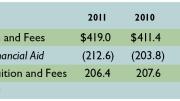Following publication of Harvard’s fiscal 2011 financial report (see “Deficit Days”), the Faculty of Arts and Sciences (FAS) released details of its financial operations during the year ended last June 30. The report covers FAS’s most challenging year since the 2008 financial crisis: successive, significant annual reductions in endowment distributions—by far its largest source of operating revenues—required controlling expenses and maximizing financial flexibility, while accommodating urgent priorities such as sustaining financial aid. In fiscal 2012, however, the distribution has begun to rise modestly, and dean of administration and finance Leslie A. Kirwan in early October projected that FAS would be able to eliminate its structural deficit by the end of the year.
The report—prepared for management rather than accounting purposes (and not meant to represent a subset of the University’s financial statements)—details:
A smaller operating surplus and a consolidated net deficit. A $19.5-million operating surplus, down from $125.8 million in fiscal 2010, reflected a 4.5 percent ($47 million) increase in expenses, to $1.1 billion, and a 5 percent ($59 million) decrease in revenues, driven by the $70-million (11.3 percent) drop in the endowment distribution. The distribution peaked at $655 million in fiscal 2009—54 percent of FAS’s operating revenues; in fiscal 2011, the distribution accounted for 49 percent of revenues. The consolidated net deficit was $23.2 million in fiscal 2011 (versus a $44.5-million surplus in fiscal 2010).
Pressure on tuition and fee income. Tuition and fees, after subtracting financial-aid disbursements, represent nearly half the unrestricted revenue of FAS as a whole, and more than half the unrestricted revenue of the College, the Graduate School of Arts and Sciences, and the faculty itself. Thus it is notable that with endowment distribution falling and financial-aid costs rising, net tuition and fee revenue declined in fiscal 2011, despite term-bill increases (see table above).
Compensation and other expenses. Salaries, wages, and benefits total 51 percent of FAS’s expenses: $563.5 million in fiscal 2011, up 2.9 percent from the prior year, reflecting a 2 percent increase in salaries and 8 percent growth in benefit costs.
Other expenses. Facilities operation and maintenance costs totaled $133 million, up $6 million from fiscal 2010, but well below fiscal 2009’s $145 million. Miscellaneous expenses of $60.5 million (for travel, entertainment, postage, insurance, telecommunications, etc.) are down 16 percent since fiscal 2009.
Balance-sheet strengths. FAS has prefunded $16 million of fiscal 2012 capital projects from the fiscal 2011 operating budget, and prepaid $13.2 million of principal from its long-term debt ($915 million as of June 30, excluding faculty loans).
For a more detailed report, see https://harvardmag.com/fas-finances.









